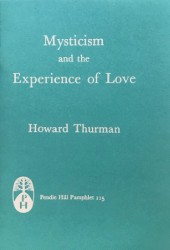Synopsis
The religion of the inner life, or mysticism, is life affirming and reaches its highest goal in love.
About the Author(s)
Howard Thurman was born in Daytona Beach, Florida. His teachers needed to make special arrangements for him to attend eighth grade and qualify for high school. He then needed to board in Jacksonville in order to attend high school. In spite of the privations associated with living away from home, he graduated as the class valedictorian and enrolled at Morehouse University. He studied at Colgate-Rochester Seminary between 1923 and 1926. While working as an assistant pastor during this period, Howard Thurman recognized his calling as a minister. After graduating first in his class in 1926, he went to Oberlin, Ohio, where he ministered to a Baptist congregation. Almost immediately after graduating from Colgate, Thurman married Kate Kelly. They had one child before Kate’s death in 1930. In 1929, Thurman left Oberlin for Haverford College, where he studied with Rufus Jones, whose work on ethical mysticism provided inspiration. During his work at Haverford, Thurman was offered a position as director of religious life at Morehouse and Spellman Colleges in Atlanta. At Morehouse, he began to use his pulpit to speak out for social justice. He also wrote Deep River, which talked about the role of the African American religious tradition in maintaining human dignity in the face of racism. In 1932, Thurman accepted a position as the dean of Rankin Chapel at Howard University, and taught in the Theological school there. The teachings of Gandhi influenced Thurman’s belief in social justice, and he went to India in 1935. He remained at Howard until 1944, when he became a co-pastor at San Francisco’s newly founded Church of the Fellowship of All Peoples. This church fulfilled Thurman’s ideal of a church, which ministered to everyone, regardless of race or class. In 1953, Life Magazine named him one of the twelve greatest pastors in the United States. That same year, he was offered a job as the Dean of Marsh Chapel at Boston University. He was the first African American preacher to work full time at a traditionally white institution. In addition to preaching regularly and writing eleven books, Thurman worked on integrating Boston communities. Thurman retired in 1965, although he went on to direct the Howard Thurman educational trust, which endowed scholarships and provided grants for religious, educational and scientific projects. Howard Thurman died in 1981.
Pendle Hill Pamphlet #115






